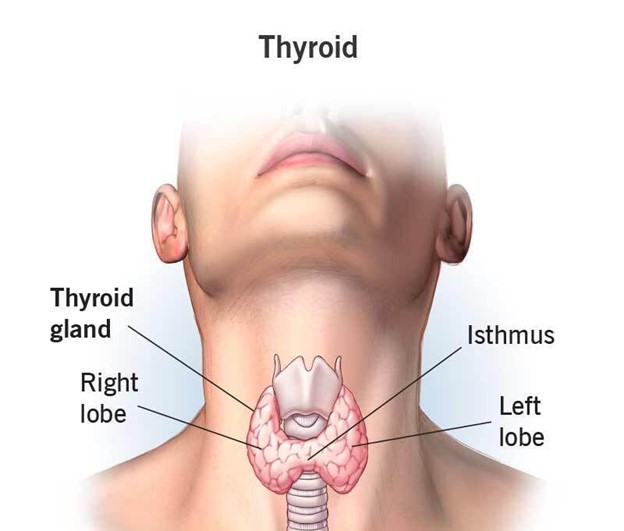A goiter is an enlargement or hypertrophy of which gland?
Thyroid.
Posterior pituitary.
Adrenal.
Anterior pituitary.
The Correct Answer is A
Choice A rationale:
A goiter refers to the enlargement or hypertrophy of the thyroid gland. This can occur due to various reasons, such as iodine deficiency, autoimmune disorders like Hashimoto's thyroiditis, or Graves' disease (which is associated with hyperthyroidism). The thyroid gland produces hormones that regulate metabolism and growth, and when it becomes enlarged, it can lead to visible swelling in the neck.
Choice B rationale:
The posterior pituitary gland is responsible for the release of hormones like vasopressin (antidiuretic hormone) and oxytocin. A goiter is not associated with the posterior pituitary gland. Issues with the posterior pituitary can lead to problems with water balance and uterine contractions, but not thyroid enlargement.

Choice C rationale:
The adrenal glands are responsible for producing hormones like cortisol and adrenaline. While adrenal disorders can lead to various hormonal imbalances, a goiter is not related to adrenal gland function. Adrenal issues might cause symptoms like fatigue, weight changes, and blood pressure irregularities.
Choice D rationale:
The anterior pituitary gland produces hormones that regulate the functions of other endocrine glands, including the thyroid gland. However, a goiter is not directly associated with the anterior pituitary. The anterior pituitary's malfunction can result in disorders like growth hormone deficiency or Cushing's disease, but not thyroid enlargement.
Nursing Test Bank
Naxlex Comprehensive Predictor Exams
Related Questions
Correct Answer is D
Explanation
Answer is: d. Apply direct pressure above the catheterization site.
Explanation: The first action should be to apply direct pressure above the catheterization site to help control the bleeding and minimize blood loss. This will also give the nurse time to prepare additional interventions or supplies if necessary.
Choice a. is wrong because placing the child in the Trendelenburg position is not an appropriate initial nursing action in this scenario. This position can increase intracranial pressure and is typically used for patients experiencing shock or hypotension.
Choice b. is wrong because applying a new bandage with more pressure might be a subsequent action, but the priority is to apply direct pressure to slow down the bleeding.
Choice c. is wrong because notifying the physician is important, but the nurse should first take immediate action to control the bleeding and minimize potential harm to the patient.
Correct Answer is B
Explanation
The correct answer is choice B: Pulmonic stenosis, ventricular septal defect, overriding aorta, right ventricular hypertrophy.
Choice A rationale:
Pulmonic stenosis, ventricular septal defect, aortic hypertrophy, left ventricular hypertrophy. This choice is incorrect because it includes "aortic hypertrophy" and "left ventricular hypertrophy," which are not components of the tetralogy of Fallot. Aortic hypertrophy is not a recognized structural defect in tetralogy of Fallot, and left ventricular hypertrophy is not a characteristic feature of this congenital heart condition.
Choice B rationale:
Pulmonic stenosis, ventricular septal defect, overriding aorta, right ventricular hypertrophy. This is the correct choice. Tetralogy of Fallot is characterized by four specific structural defects: pulmonic stenosis (narrowing of the pulmonary valve), ventricular septal defect (hole between the right and left ventricles), overriding aorta (aorta positioned over the ventricular septal defect, receiving blood from both ventricles), and right ventricular hypertrophy (enlargement of the right ventricle due to increased workload).
Choice C rationale:
Aortic stenosis, ventricular septal defect, overriding aorta, right ventricular hypertrophy. This choice is incorrect because it includes "aortic stenosis," which is not part of the tetralogy of Fallot. In tetralogy of Fallot, the stenosis occurs at the pulmonary valve, not the aortic valve.
Choice D rationale:
Aortic stenosis, atrial septal defect, overriding aorta, left ventricular hypertrophy. This choice is incorrect. While "overriding aorta" is present in tetralogy of Fallot, "atrial septal defect" and "left ventricular hypertrophy" are not part of this condition. Atrial septal defects involve a hole between the two atria, not the ventricles, and left ventricular hypertrophy is not typically seen in tetralogy of Fallot.
Whether you are a student looking to ace your exams or a practicing nurse seeking to enhance your expertise , our nursing education contents will empower you with the confidence and competence to make a difference in the lives of patients and become a respected leader in the healthcare field.
Visit Naxlex, invest in your future and unlock endless possibilities with our unparalleled nursing education contents today
Report Wrong Answer on the Current Question
Do you disagree with the answer? If yes, what is your expected answer? Explain.
Kindly be descriptive with the issue you are facing.
